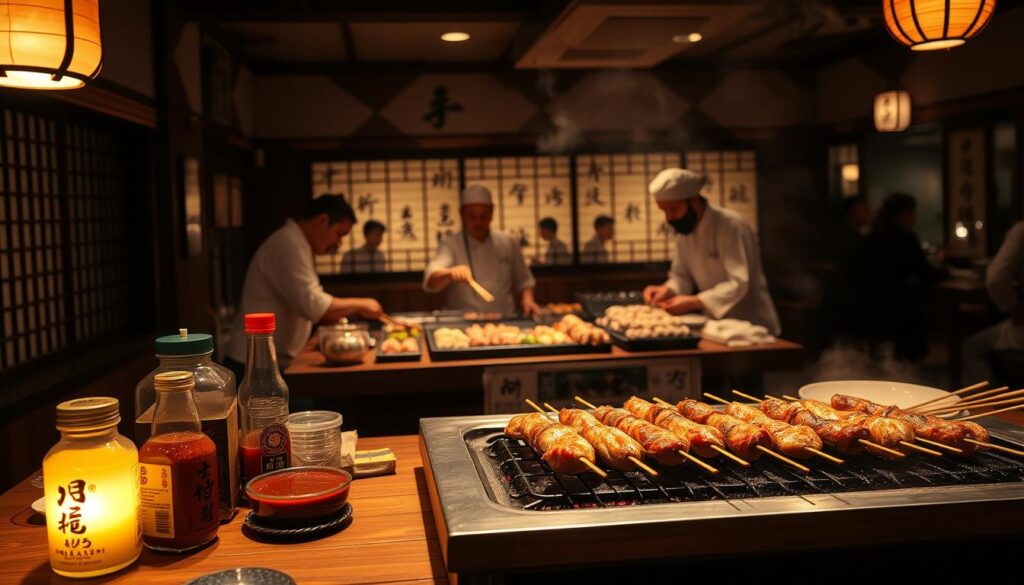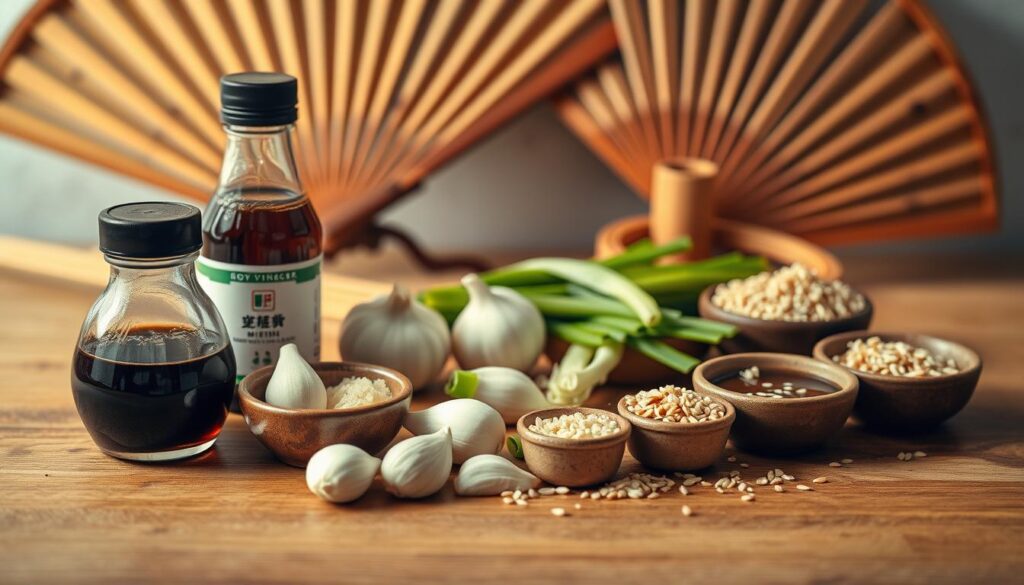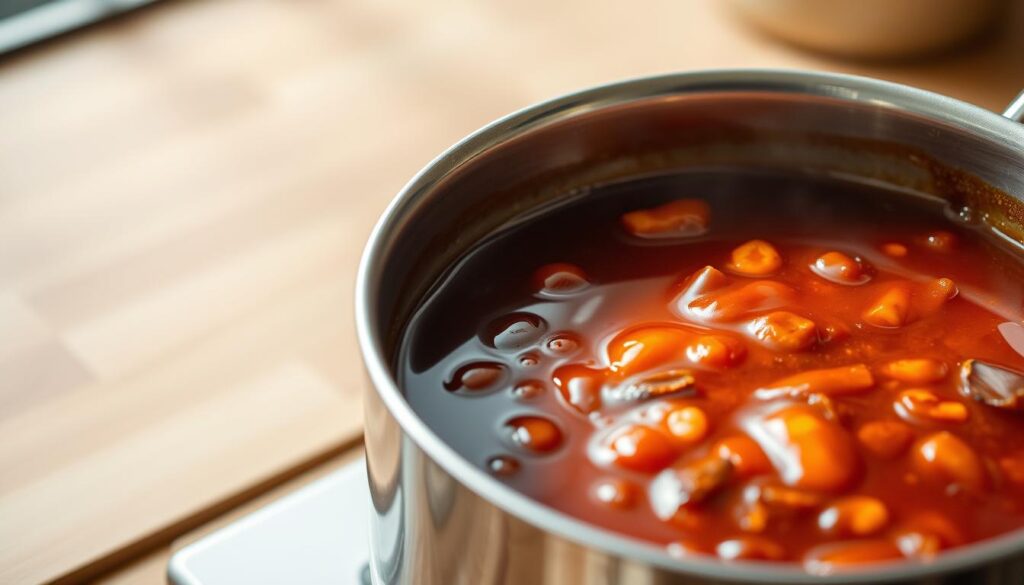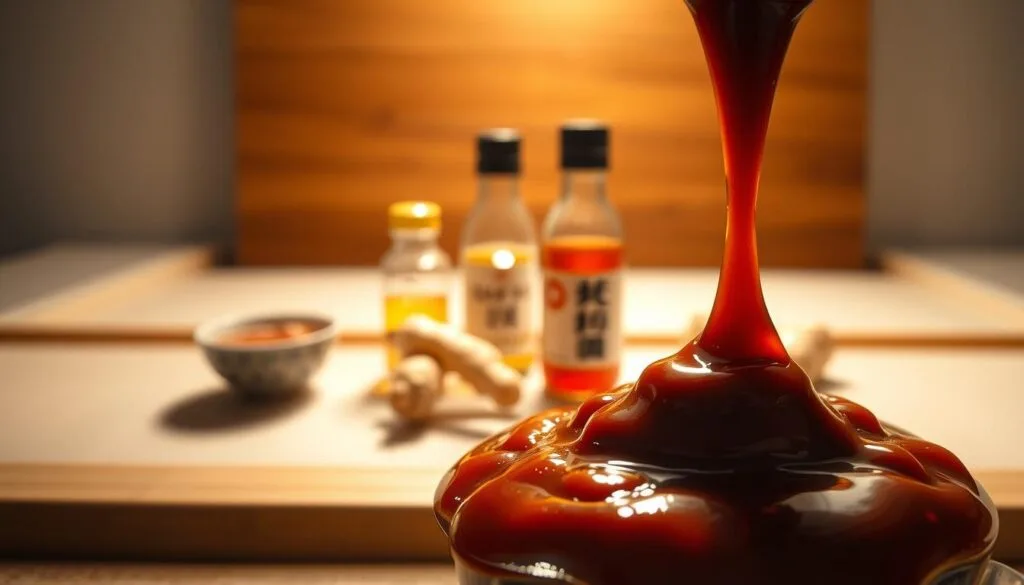Japanese BBQ sauce is a tasty condiment in Japanese cooking. It’s made from soy sauce, sake, mirin, and sugar. This mix gives it a sweet and savory taste. We’ll explore its origins, ingredients, recipes, and uses, so you can try them at home.
This sauce adds a rich flavor to many dishes. It’s perfect for both experienced chefs and beginners. You’ll find this guide helpful in making your own Japanese BBQ sauce recipes.
Introduction to Japanese BBQ Sauce
We’ll dive into Japanese BBQ sauce, covering its history, ingredients, and uses. You’ll also get tasty recipes to try at home. From classic to modern recipes, we’ve got you covered. You’ll learn how to make your own delicious Japanese BBQ sauce.
Key Takeaways
- Japanese BBQ sauce is a popular condiment used in Japanese cuisine
- It is made from a combination of ingredients such as soy sauce, sake, mirin, and sugar
- Japanese BBQ sauce has a sweet and savory flavor profile
- It can be used to create a variety of delicious recipes
- This article will provide you with delicious recipes and information on japanese-bbq sauce
- You will learn about the origins, ingredients, and uses of japanese bbq sauce
- You will be able to create your own delicious japanese bbq-sauce recipes at home
Understanding Japanese BBQ Sauce Origins
Japanese BBQ sauce has a deep history tied to grilling traditions. The practice of grilling meat and veggies over an open flame started in the Edo period. A sweet and savory sauce was used to boost flavors back then.
This sauce, now known as Japanese BBQ-sauce, was crucial in grilling traditions. It’s a key part of Japan’s grilling culture.
The story of Japanese BBQ sauce’s evolution is intriguing. Different parts of Japan created their own sauce styles. The north’s sauces are sweet and tangy, while the south’s are spicy and smoky.
These regional sauces have made dishes in Japan unique and tasty. They’ve shaped the flavors of many dishes, making them stand out.

- Use of high-quality ingredients, such as fresh meat and vegetables
- Attention to detail in the grilling process, including temperature and cooking time
- Emphasis on presentation and visual appeal
These elements, along with Japanese BBQ-sauce, create a special and flavorful dining experience. It’s truly Japanese. By learning about Japanese BBQ-sauce’s origins and evolution, we can see its deep cultural significance. It’s a big part of Japan’s grilling traditions.
Essential Ingredients for Japanese BBQ Sauce
To make a real Japanese BBQ-sauce, you need the right essential ingredients. The main parts are soy sauce, sake, mirin, and sugar. These mix together to make a sauce that’s both sweet and savory.
Adding garlic, ginger, and sesame oil can make the sauce even better. Here are some key ingredients to think about:
- Soy sauce: gives a rich, savory taste
- Sake: adds a subtle, slightly sweet flavor
- Mirin: makes the sauce sweet and syrupy
- Sugar: balances out the savory flavors
- Garlic and ginger: add a strong, aromatic taste
- Sesame oil: improves the sauce’s texture and flavor
Using top-notch ingredients is key to a tasty Japanese BBQ sauce. By mixing these essential ingredients just right, you get a sauce that’s full of flavor and aroma.

Classic Japanese BBQ Sauce Recipe
A classic japanese bbq-sauce recipe is loved in many Japanese homes. Its simplicity makes it special. This traditional sauce uses soy sauce, sake, mirin, and sugar.
Base Ingredients List
- 1/2 cup soy sauce
- 1/4 cup sake
- 1/4 cup mirin
- 2 tablespoons sugar
Step-by-Step Preparation Guide
To make the sauce, mix the ingredients in a saucepan and heat until boiling. Then, lower the heat and simmer for a few minutes. Whisk constantly to avoid lumps. This recipe is easy and needs just a few ingredients, perfect for beginners.

Cooking Tips and Techniques
Using a thermometer and whisking constantly helps make a smooth sauce. This classic recipe is a great way to start exploring Japanese BBQ sauce.
Sweet and Savory Variations
Japanese bbq sauce comes in many flavors to please everyone. The sweet and savory mix is a favorite. It’s made by tweaking the ingredients or adding honey or fruit. This mix makes the sauce smooth and perfect for grilled foods.
Adding garlic or ginger to the sauce gives it a strong, aromatic taste. You can play with the amounts to get a flavor that’s just right. For example, a bit of honey makes it sweet, while more garlic or ginger makes it savory.
Here are some tips for making your own sweet and savory Japanese BBQ-sauce:
- Try different ingredients like honey, garlic, or ginger to find your favorite mix.
- Change the ingredient ratios to get the sweetness or savory taste you want.
- Think about adding fruit or spices to make the flavor even more interesting.
Exploring Japanese BBQ sauce variations can make your grilled dishes more exciting. Whether you like sweet and savory or just savory, there’s a sauce for you.
Spicy Japanese BBQ Sauce Alternative
If you like a spicy kick, try a spicy Japanese BBQ-sauce. You can add red pepper flakes or sriracha sauce. This makes the sauce perfect for those who enjoy a bit of heat.
To make this spicy sauce, start by adjusting the heat to your liking. You can add more red pepper flakes or sriracha sauce as needed. You can also try using gochujang instead of soy sauce for a spicy, savory flavor.
- Add diced jalapenos or serrano peppers to the sauce.
- Use spicy garlic or ginger for extra flavor.
- Try different hot sauces like Frank’s RedHot or Cholula.
By making these changes, you can create a unique and tasty spicy Japanese BBQ-sauce. It’s great for adding a kick to your favorite dishes. Whether you’re looking for a spicy twist or just want to try something new, this sauce is sure to impress.
Best Meats to Pair with Japanese BBQ Sauce
Japanese BBQ sauce pairs well with many meats. Beef, chicken, and seafood are top choices. The key is to match the sauce’s flavors with the meat’s texture.
For great pairings, balance the sauce’s sweet, savory, and umami with the meat’s natural taste. Richer meats like ribeye or lamb can handle bold sauces. Delicate meats like chicken or salmon need a lighter touch.
- Beef: ribeye steak, sirloin, or beef short ribs
- Chicken: chicken breast, thighs, or wings
- Seafood: salmon fillet, shrimp, or scallops
Choosing the right meat depends on your taste and the flavor you want. By matching the meat’s characteristics with the sauce, you’ll get a tasty and balanced dish.
Vegetarian Applications for Japanese BBQ Sauce
Japanese BBQ sauce is great for many dishes, including vegetarian applications. Its sweet and savory taste is perfect for stir-fries, noodle dishes, and vegetable skewers. When using it in vegetarian dishes, think about the veggies’ flavor and texture, and the sauce’s taste.
The japanese bbq-sauce vegetarian options are endless. It goes well with veggies like bell peppers, zucchini, and mushrooms. You can use it as a marinade or seasoning, adding flavor to simple dishes. Some favorite vegetarian applications include:
- Stir-fries with tofu and mixed vegetables
- Noodle dishes with roasted vegetables and Japanese BBQ sauce
- Grilled vegetable skewers with a side of Japanese BBQ-sauce for dipping
Japanese BBQ sauce is also good for vegetarian burgers or as a dip for spring rolls. The secret to using it in vegetarian applications is to try different combinations. Its unique flavor makes it a great addition to many vegetarian dishes.
Storage and Shelf Life Tips
Proper storage is key for keeping your japanese bbq-sauce fresh. Store it in a clean, airtight container like a glass jar with a tight lid. This prevents contamination and spoilage.
The shelf life of japanese bbq sauce depends on how you store it. It can last up to two weeks in the fridge or three months in the freezer. Always keep it in the fridge at 40°F (4°C) or below. Check it often for mold or an off smell.
Proper Handling and Storage
- Use a clean, airtight container to store the sauce
- Keep the sauce in the refrigerator at a temperature below 40°F (4°C)
- Check the sauce regularly for signs of spoilage
By following these tips, you can enjoy your japanese bbq-sauce longer. Always check the sauce before using it. If you see mold or an off smell, it’s best to throw it away.
Modern Fusion Adaptations
Japanese bbq sauce fusion is getting more popular. Chefs and home cooks are finding new ways to use it. They mix it with Western dishes like burgers and sandwiches.
This mix of flavors creates unique and tasty dishes. For example, using Japanese bbq sauce as a marinade for grilled meats. It also works well in stir-fries and noodle dishes.
The sweet and savory taste of Japanese bbq-sauce goes with many foods. Contemporary cooking methods like sous vide make dishes tender and flavorful.
Here are some ideas for using Japanese bbq sauce in modern dishes:
- Japanese bbq sauce-glazed burgers
- Grilled chicken or beef skewers with Japanese bbq-sauce
- Japanese bbq sauce-based stir-fries with noodles or rice
- Sous vide Japanese bbq-sauce-marinated steak or salmon
These are just a few ways to use Japanese bbq sauce in modern dishes. Its rich flavor makes it great for many recipes. From traditional Japanese to modern fusion, it’s a versatile ingredient.
Common Mistakes to Avoid When Making Japanese BBQ Sauce
When making Japanese BBQ sauce, it’s key to steer clear of common errors. Using low-quality ingredients can make the sauce taste bland. Also, not whisking the sauce constantly can mess up its consistency.
Here are some common mistakes to avoid when making Japanese BBQ-sauce:
- Not monitoring the temperature, which can cause the sauce to burn or become too thick
- Not adjusting the seasoning, which can result in a sauce that’s too salty or too sweet
- Using the wrong type of sugar, which can affect the flavor and texture of the sauce
By avoiding these japanese bbq sauce mistakes and following a few simple tips, you can create a delicious and authentic Japanese BBQ-sauce that’s perfect for grilling or cooking.
Other common mistakes include not using the right vinegar and not simmering the sauce long enough. These can make the sauce taste off or not thick enough. By avoiding these errors and using top-notch ingredients, you can make a Japanese BBQ sauce that will wow everyone.
Health Benefits and Nutritional Information
Japanese bbq sauce is packed with health benefits. It’s made from soy sauce, sugar, vinegar, and spices. These ingredients offer many nutritional perks.
One major benefit is its high antioxidant content. Antioxidants help protect cells and lower disease risk.
Japanese bbq sauce is also low in calories. A serving has about 50-60 calories. But, it’s important to watch the sodium and sugar levels.
By using low-sodium soy sauce and less sugar, you can make a healthier version. This way, you can enjoy the sauce’s benefits without overdoing it.
- High antioxidant content
- Low calorie count
- Good source of vitamins and minerals
To maximize the health benefits of japanese bbq sauce, use it in moderation. It should be part of a balanced diet. This way, you can enjoy its nutritional value and health perks.
Conclusion
Exploring Japanese BBQ sauce recipes has shown us its amazing versatility. It comes from a rich grilling culture in Japan. Now, it’s used in many modern dishes, making them taste incredible.
Whether you’re a pro chef or just starting out, Japanese BBQ-sauce can take your cooking to new heights. By learning about its ingredients and trying different recipes, you can make your meals stand out. You’ll impress everyone with the amazing flavors it adds.
Keep exploring the world of Japanese BBQ-sauce. It has a deep history and a spirit of innovation. Try different flavors and find the perfect matches for your taste. With this guide, you’re ready to start a flavorful journey that will delight your senses.
FAQ
What is Japanese BBQ sauce?
Japanese BBQ sauce, also known as teriyaki sauce, is a favorite in Japanese cooking. It’s made from soy sauce, sake, mirin, and sugar. These ingredients mix to create a sweet and savory taste.
What are the essential ingredients for Japanese BBQ sauce?
The key ingredients for Japanese BBQ sauce are soy sauce, sake, mirin, and sugar. These are mixed in a special ratio. This makes a sauce that’s both tasty and fragrant.
How do I make a classic Japanese BBQ sauce recipe?
Making classic Japanese BBQ sauce is easy. You need soy sauce, sake, mirin, and sugar. Mix these in a saucepan, boil, then simmer for a few minutes.
Can I make variations of Japanese BBQ sauce?
Yes, you can make different versions of Japanese BBQ sauce. You can add honey or fruit for a sweeter taste. For spice, try red pepper flakes or sriracha.
What meats pair best with Japanese BBQ sauce?
Japanese BBQ sauce goes well with many meats. Try it with ribeye steak, chicken breast, or salmon fillet.
Can I use Japanese BBQ sauce in vegetarian dishes?
Absolutely, Japanese BBQ sauce is great for veggies too. Use it in stir-fries, noodle dishes, or on vegetable skewers.
How do I properly store and preserve Japanese BBQ sauce?
Store Japanese BBQ sauce in the fridge for up to two weeks. Or freeze it for three months. Use a glass jar with a tight lid and keep it cold.
What are some common mistakes to avoid when making Japanese BBQ sauce?
Avoid using low-quality ingredients and not whisking the sauce. Also, don’t forget to check the temperature and seasonings.
What are the health benefits and nutritional information of Japanese BBQ sauce?
Japanese BBQ sauce is relatively healthy. It’s low in calories and rich in antioxidants. But, watch out for sodium and sugar levels.
For more recipes, please click on link below :

